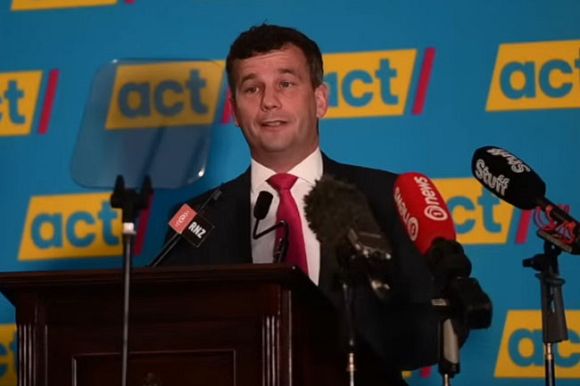New Zealanders continue gathering to oppose a political threat to the Treaty of Waitangi, which protects Māori rights, writes Cherie Moselen.
NEW ZEALANDERS are protesting a political bid to dismantle the 125-year-old Treaty that safeguards Indigenous rights.
The Principles of the Treaty of Waitangi Bill sparked protests recently that saw more than 40,000 people take to the streets in coordinated marches, calling for the New Zealand Government to "Kill the Bill".
The controversial Bill was introduced to Parliament in November last year by David Seymour's right-wing minority political party and member of the Luxon Coalition Government, ACT New Zealand (A.C.T.).
A.C.T. wants to "reinterpret" the Treaty's principles in law. Were it to pass, the Bill would trample on the rights of Māori, who constitute around 20 per cent of New Zealand's population of 5.3 million.
As reported by Al Jazeera, a veteran Māori issues journalist referred to the Bill as an “attempt to redefine decades of exhaustive research and negotiated understandings of what constitute ‘principles’ of the treaty”.
On 6 February, when crowds gathered in Waitangi at the spiritual home of Te Tiriti o Waitangi (The Treaty of Waitangi) to participate in New Zealand's national day celebration, many voiced their outrage at A.C.T.'s attempt to spike the country's founding agreement.
Treated with contempt
Seymour, who has Māori roots, was formally asked by his hapū (tribe) not to speak at Waitangi this year due to the divisive Bill. Despite this request, he chose the occasion to platform A.C.T.'s proposed Treaty changes and claimed they would benefit all New Zealanders, including Māori.
Members of the welcoming party turned their backs on him — a response undoubtedly linked to A.C.T.'s prioritising of private property rights over social and environmental concerns and the Treaty that demands accountability to keep a balance.
The Treaty of Waitangi is championed specifically by New Zealand’s Human Rights Commission, because:
... it affirms particular rights and responsibilities for Māori as Māori to protect and preserve their lands, forests, waters and other treasures for future generations.
IA contacted David Seymour to ask why, since it has been commended by the NZ Human Rights Commission, the Treaty needed revising at all, but had not received a response by the time this story was published.
Prime Minister Christopher Luxon was notably absent at Waitangi on 6 February, accused by some Māori leaders and political opponents of "hiding".
About Luxon's absence, tribal council chair of Ngāi Tahu, Justin Tipa, said:
"True political leadership is about meeting people where they are and synthesising the interest of various strands of society into a workable whole... when there's an absence of this type of leadership, voices that represent comparatively simpler and shallower viewpoints begin to shine through."
Muzzling Māori voice
Seymour’s attempt to dismantle the Treaty comes hard on the Coalition's urging an end to te reo (Māori language) being used in government departments.
About such discrimination, former Labour Prime Minister Chris Hipkins said:
If you look at the MFAT [Ministry of Foreign Affairs and Trade] for example, they issued a memo in the transition period saying that people should stop using te reo Māori.
You know, ministers have been indicating to government departments that they don't want to see te reo Māori in their documentation — I think that's wrong.
A.C.T.'s desire to “ringfence” Māori influence in the co-governance of New Zealand is viewed by many as a smear on the country’s largely progressive bi-cultural relationship, which has often been compared as favourable to that of Australia, for example.
Unlike in Australia, where the British Crown never acknowledged Indigenous Australians as sovereign or having land rights, NZ's Treaty helps protect its Indigenous culture because public servants must '... develop policy which genuinely reflects Māori values, interests and needs'.
Four dedicated Māori seats were mandated in 1867 to establish political agency for New Zealand’s First Nation's people, highlighting a key social difference between Australia and New Zealand.
Australia's recent attempt through a referendum to enshrine a First Nations Voice to Parliament – although, it didn't carry legislative power – failed.
New Zealanders speak out
Feedback on the Principles of the Treaty of Waitangi Bill broke records recently, with Parliament receiving more than 300,000 written submissions — three times more than any other bill.
New Zealand is no stranger to “the power of the people”. In 1975, 50 marchers led by 79-year-old Te Rarawa leader Dame Whina Cooper braved a 1000-kilometre walk to Wellington to protest the relentless confiscation of Māori land. Others joined until a 5,000-strong cohort reached Parliament to present a petition signed by 60,000 people to then-PM Bill Rowling.
A month after that land march, The Treaty of Waitangi Act 1975 was given Royal assent, paving the way for The Waitangi Tribunal to investigate alleged breaches by the Crown of promises made in the Treaty.
Although a small nation, Australia’s Antipodean other has stood tall on significant occasions, giving rise to the notion that big thinkers rock the country’s social and political cradle — which is why A.C.T.'s attempt to alienate the country's heartland seems backwards in the extreme.
It's revealing that Waitangi literally means “weeping waters”.
This year, on Waitangi Day, New Zealanders were crying out for their Government to step up and kill the Bill that threatens their very identity.
Cherie Moselen is an Independent Australia assistant editor and freelance writer who grew up in New Zealand. Her Māori ancestral roots are Ngāti Kahu and Ngāti Te Ata.You can follow her on Bluesky @cmoztrue.bsky.social.
 This work is licensed under a Creative Commons Attribution-NonCommercial-NoDerivs 3.0 Australia License
This work is licensed under a Creative Commons Attribution-NonCommercial-NoDerivs 3.0 Australia License
Support independent journalism Subscribe to IA.














